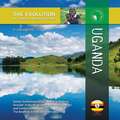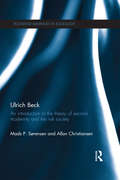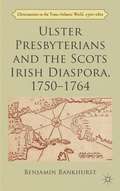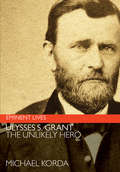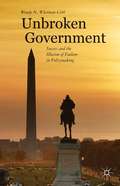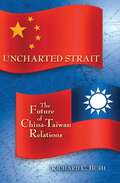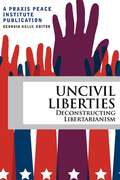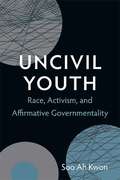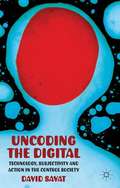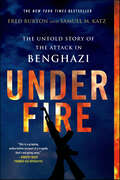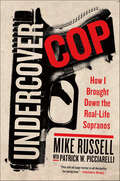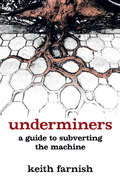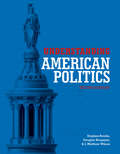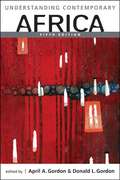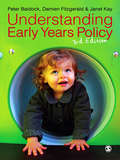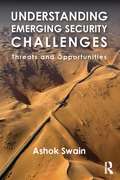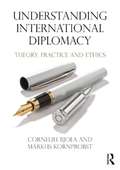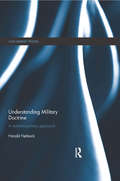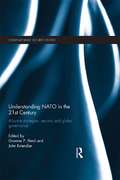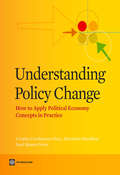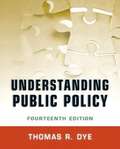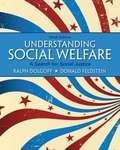- Table View
- List View
US Programs Affecting Food and Agricultural Marketing
by Walter J. Armbruster Ronald D. KnutsonThis book discusses the increased scope, complexity and globalization of markets, the changes in technology behind this, and the need for policy and program adjustments. Also discusses the development of supply chains both domestically and globally.
Uganda (The Evolution of Africa's Major Nations)
by Lauri KubuitsileUganda is sometimes called the "land of lakes," because almost one-third of its territory is covered by water. The greatest Ugandan body of water is Lake Victoria, the second-largest freshwater lake in the world. The world's longest river, the Nile, also has its source in Uganda. Uganda has faced a great deal of turmoil since becoming independent in 1962. During the rule of Idi Amin in the 1970s, some 300,000 Ugandans--mostly from the Acholi and Lano tribes--were massacred. Political instability and unrest in the country continued into the next decade. However, since the 1986 election of Yoweri Museveni, Uganda has made great progress socially and economically. In recent years the country has forged closer ties with the United States and other foreign nations.
Ulrich Beck: An Introduction to the Theory of Second Modernity and the Risk Society (Routledge Advances in Sociology)
by Allan Christiansen Mads SørensenSince the 1980s, Ulrich Beck has worked extensively on his theories of second modernity and the risk society. In Ulrich Beck, Mads P. Sørensen and Allan Christiansen provide an extensive and thorough introduction to the German sociologist’s collected works. The book covers his sociology of work, his theories of individualization, globalization and subpolitics, his world famous theory of the risk society and second modernity as well as his latest work on cosmopolitanism. Focusing on the theory outlined in Beck’s chief work, Risk Society, and on his theory of second modernity, Sørensen and Christiansen explain the sociologist’s ideas and writing in a clear and accessible way. Largely concerned with the last 25 years of Beck’s authorship, the book nevertheless takes a retrospective look at his works from the late seventies and early eighties, and reviews the critique that has been raised against Beck’s sociology through the years. Each chapter of Ulrich Beck comes with a list of suggested further reading, as well as explanations of core terms. The book also includes a biography of Beck, and full bibliographies of his work in both English and German. This comprehensive introduction will be of interest to all students of sociology, contemporary social theory, globalization theory, environmental studies, politics, geography and risk studies.
Ulster Presbyterians and the Scots Irish Diaspora, 1750–1764
by Benjamin BankhurstBankhurst examines how news regarding the violent struggle to control the borderlands of British North America between 1740 and 1760 resonated among communities in Ireland with familial links to the colonies. This work considers how intense Irish press coverage and American fundraising drives in Ireland produced empathy among Ulster Presbyterians.
Ulysses S. Grant
by Michael KordaA lavishly illustrated edition of Michael Korda's acclaimed biography of the man who ended the Civil War, served two terms as president, and wrote one of the most successful military memoirs in American literature Ulysses S. Grant was the first officer since George Washington to become a four-star general in the United States Army, and the only president between Andrew Jackson and Woodrow Wilson to serve eight consecutive years in the White House. In this succinct and vivid biography, newly conceived with twenty-four pages of full-color art and many black-and-white illustrations throughout, Michael Korda offers a dramatic reconsideration of the man, his life, and his presidency. Ulysses S. Grant is an evenhanded and stirring portrait of a flawed leader who nevertheless ably guided the United States through a pivotal juncture in its history.
Unbroken Government
by Wendy N. Whitman CobbUnbroken Government presents a positive message about the United States government by exploring the influence of presidents, the Congress, and bureaucracies in making policy. Using a three stage theory of the policymaking process, Whitman Cobb shows how only some institutions are influential at certain points in time: the Senate and president when policy problems first emerge, the House of Representatives and bureaucracy in routine periods, and the Senate and president during periods of crisis. Employing analyses of such varied case studies as human spaceflight and clean air, Unbroken Government focuses on policymaking actions rarely seen and demonstrates that despite a seeming breakdown in government, policymaking continues on unabated.
Uncharted Strait
by Richard C. BushThe future of the Taiwan Strait is more wide open than at any other time in recent decades. Tensions between China and Taiwan have eased since 2008. But the movement toward full rapprochement remains fragile. Whether the two sides of the Strait can sustain and expand a cooperative relationship after years of mutual distrust and fear is still uncertain.The waters of the Strait are uncharted, and each side worries about shoals beneath the surface. The current engagement between Beijing and Taipei may make possible a solution to their six-decade-long dispute. Whether, when, and how that might happen is, however, shrouded in doubt. China fears the island's permanent separation, by way of either an overt move to de jure independence or continued refusal to unify with the mainland. Taiwan fears subordination to an authoritarian regime that does not have Taipei's interests at heart. And the United States worries about the stability of the East Asian region.Richard Bush, who studied issues surrounding Taiwan during almost twenty years in the U.S. government, explains the current state of relations between China and Taiwan, providing the details of what led to the current situation. And he extrapolates on the likely future of cross-Strait relations. Bush also discusses America's stake, analyzing possible ramifications for U.S. interests in the critically important East Asia region and recommends steps to protect those interests."At the heart of the [Taiwan conundrum] is a question of definition. Does the dispute stem from the protracted division of the Chinese state after World War II, or does the Republic of China on Taiwan in some sense constitute a successor state of the old Republic of China (ROC), one on a par with the People's Republic of China on the Chinese mainland? Whether and how the unification of the two entities might occur hinges on the answer. Indeed, I have argued that the core of the dispute between the two sides has been their disagreement over whether the Republic of China--or Taiwan--is a sovereign entity for purposes of cross-Strait relations. It follows that if unification is a real option, the two sides must form a political union that bridges the disagreement over the island's legal status. Is that possible?"--from the Introduction
Uncharted Strait
by Richard C. BushThe future of the Taiwan Strait is more wide open than at any other time in recent decades. Tensions between China and Taiwan have eased since 2008. But the movement toward full rapprochement remains fragile. Whether the two sides of the Strait can sustain and expand a cooperative relationship after years of mutual distrust and fear is still uncertain.The waters of the Strait are uncharted, and each side worries about shoals beneath the surface. The current engagement between Beijing and Taipei may make possible a solution to their six-decade-long dispute. Whether, when, and how that might happen is, however, shrouded in doubt. China fears the island's permanent separation, by way of either an overt move to de jure independence or continued refusal to unify with the mainland. Taiwan fears subordination to an authoritarian regime that does not have Taipei's interests at heart. And the United States worries about the stability of the East Asian region.Richard Bush, who studied issues surrounding Taiwan during almost twenty years in the U.S. government, explains the current state of relations between China and Taiwan, providing the details of what led to the current situation. And he extrapolates on the likely future of cross-Strait relations. Bush also discusses America's stake, analyzing possible ramifications for U.S. interests in the critically important East Asia region and recommends steps to protect those interests."At the heart of the [Taiwan conundrum] is a question of definition. Does the dispute stem from the protracted division of the Chinese state after World War II, or does the Republic of China on Taiwan in some sense constitute a successor state of the old Republic of China (ROC), one on a par with the People's Republic of China on the Chinese mainland? Whether and how the unification of the two entities might occur hinges on the answer. Indeed, I have argued that the core of the dispute between the two sides has been their disagreement over whether the Republic of China-or Taiwan-is a sovereign entity for purposes of cross-Strait relations. It follows that if unification is a real option, the two sides must form a political union that bridges the disagreement over the island's legal status. Is that possible?"-from the Introduction
Uncivil Liberties: Deconstructing Libertarianism
by Hazel Henderson Gus Dizerega Benjamin Colby Ben Boyce Barry Spector Julianne Maurseth Georgia KellyLast year, Praxis Peace Institute responded to the libertarian conspiracy film Thrive with a pamphlet titled "Uncivil Liberties: Deconstructing Libertarianism," carefully and concisely laying out the problems inherent in libertarian philosophy and why it is so appealing to today's society. Now, in a book by the same name, six contributors from Praxis have expounded on their arguments to create a compelling case against the radical tenants of libertarianism, demonstrating the untruths promoted within libertarian culture and how concerned citizens can avoid and refute common myths spread by extreme right-wing ideologies. This book is a must-read for anyone invested in modern politics and the future of the United States.
Uncivil Youth: Race, Activism, and Affirmative Governmentality
by Kwon Soo AhIn Uncivil Youth, Soo Ah Kwon explores youth of color activism as linked to the making of democratic citizen-subjects. Focusing attention on the relations of power that inform the social and political practices of youth of color, Kwon examines how after-school and community-based programs are often mobilized to prevent potentially "at-risk" youth from turning to "juvenile delinquency" and crime. These sorts of strategic interventions seek to mold young people to become self-empowered and responsible citizens. Theorizing this mode of youth governance as "affirmative governmentality," Kwon investigates the political conditions that both enable youth of color to achieve meaningful change and limit their ability to do so given the entrenchment of nonprofits in the logic of a neoliberal state. She draws on several years of ethnographic research with an Oakland-based, panethnic youth organization that promotes grassroots activism among its second-generation Asian and Pacific Islander members (ages fourteen to eighteen). While analyzing the contradictions of the youth organizing movement, Kwon documents the genuine contributions to social change made by the young people with whom she worked in an era of increased youth criminalization and anti-immigrant legislation.
Uncoding the Digital
by David SavatDigital media are having an enormous impact on the world. From the seemingly mundane, like playing World of Warcraft, to posting a message on Twitter or Facebook, to the operation of financial markets, to transformations in science and the economy - digital media continue to revolutionize how people live their daily life. This book challenges how we understand our relationship with our digital machines, and shows how they open up a new capacity for action in the world. A capacity for action that we should no longer simply think of in terms of movement and force, but also in terms of flow and viscosity. A capacity for action that produces a politics of fluids, and finds its expression not only in new forms of social control, but also in a renewed ability for people to engage with the world and each other.
Under Fire: The Untold Story of the Attack in Benghazi
by Fred Burton Samuel M. KatzThe New York Times bestselling inside account of the attack against the U.S. diplomatic and intelligence outposts in Benghazi, Libya.On the night of September 11, 2012, the American diplomatic mission at Benghazi, Libya, came under ferocious attack by a heavily armed group of Islamic terrorists. The prolonged firefight, and the attack hours later on a nearby CIA outpost, resulted in the deaths of four Americans, including the American ambassador to Libya, Christopher Stevens, the Information Officer, Sean Smith, and two former Navy SEALs, Tyrone Woods and Glen Doherty, working for the Central Intelligence Agency.After the fall of Qaddafi, Benghazi was transformed into a hotbed of fundamentalist fervor and a den of spies for the northern half of the African continent. Moreover, it became the center of gravity for terrorist groups strategically situated in the violent whirlwinds of the Arab Spring. On the eleventh anniversary of the 9/11 attacks against the United States, a group of heavily armed Islamic terrorists had their sights set on the U.S. diplomatic and intelligence presence in the city.Based on the exclusive cooperation of eyewitnesses and confidential sources within the intelligence, diplomatic, and military communities, Fred Burton and Samuel M. Katz reveal for the first time the terrifying twelve-hour ordeal confronted by Ambassador Christopher Stevens, Sean Smith, his Diplomatic Security (DS) contingent, and the CIA security specialists who raced to rescue them.More than just the minute-by-minute narrative of a desperate last stand in the midst of an anarchic rebellion, Under Fire is an inspiring testament to the bravery and selflessness of the men and women who put their country first while serving in one of the most dangerous regions in the world.
Undercover Cop: How I Brought Down the Real-Life Sopranos
by Mike Russell Patrick W. Picciarelli“Nobody did undercover better than Mike Russell. His story is grittier than The Sopranos, more volatile than Goodfellas. A must read.” —George Anastasia, New York Times–bestselling authorNearly taken out of the game by a shooting, New Jersey state trooper Mike Russell eventually found himself in the right place at the right time to save Andy Gerardo, one of the ranking captains of the Genovese crime family, from an attack. Quickly earning the trust of his new friend, Russell would orchestrate one of the biggest Mafia takedowns of all time.Urged by his police handlers, Russell used his cover story—an ex-cop fired for excessive force who now made his living from an oil-delivery business—and street skills to assimilate into the Genovese crime family in New Jersey, ultimately leading to more than fifty arrests of mobsters, corrupt prison officials, and even a state senator. Straddling the thin line between collecting evidence and participating in the very crimes he was leaking to the cops, Russell consistently placed himself at risk—especially when his police handlers disregarded his wishes and his well-being, conducting premature raids on the gangsters. With his marriage suffering and his family in danger, Russell took extraordinary steps to ensure his financial security and safety, demanding better terms from the police and allowing a film crew to document the final moments of the epic bust for a documentary that was later sold to HBO.A real-life version of The Sopranos, Undercover Cop immerses readers in the colorful yet harrowing trials of a standout cop who faced the mob on his own terms, crippled organized crime in New Jersey, and forever redefined undercover law enforcement.
Underminers
by Keith FarnishA vibrant, growing movement of radical protest is sweeping North America in opposition to high-stakes capitalism and the appalling environmental desecration that accompanies it. <P><P>At once entertaining, shocking and inspiring, Underminers is the monkey-wrencher's guide to navigating and subverting the industrial machine, showing how symbolic protestors can become real activists; reconnected to one another, and co-creators of a viable future.
Understanding American Politics, Second Edition
by J. Matthew Wilson Stephen Brooks Douglas KoopmanUnderstanding American Politics provides a unique introduction to the contemporary political landscape of the United States by using as its core organizing feature the idea of "American exceptionalism," a concept that is at least as old as Tocqueville's study of American democracy. The second edition of Understanding American Politics maintains the unique strengths of the first edition while offering improved coverage of political institutions. A single omnibus chapter on institutions has been reorganized and split into three separate chapters on Congress, the presidency, and the courts. A new chapter on public opinion has also been included, and the chapter on religion and politics has been completely rewritten with a deeper appreciation of religion's influential role. The book has been revised throughout, taking into account the dramatic changes that have emerged since the 2010 congressional elections and the 2012 presidential election. The text also pays close attention to what is seen as the irreversible decline in America's global influence.Visit www.utpamericanpolitics.com for additional resources.
Understanding Contemporary Africa (Understanding: Introductions to the States and Regions of the Contemporary World)
by April A. Gordon Donald L. GordonThis new edition of Understanding Contemporary Africa has been thoroughly revised to reflect the many significant events and trends of the past six years-seismic political changes, the impact of the new information technology, the strong presence of China and other foreign powers, and much more. The authors provide current analyses not only of history, politics, and economics, but also geography, environmental concerns, population shifts, and social and cultural issues. Each topic is covered in an accessible style, but with reference to the latest scholarship. Maps, photographs, and a table of basic political data enhance the text.
Understanding Early Years Policy
by Peter Baldock Damien Fitzgerald Janet KayFully updated to include all the latest developments in early years policy such as the revised Early Years Foundation Stage (EYFS), this book explores how policy is made, implemented, analysed and developed over time. There is a complete overview of early years policy, and an evaluation of its ongoing impact on practice. Case studies, points for reflection and activities encourage discussion and critical thinking. <P><P> This Third Edition has been significantly updated to include:<P> - a new chapter on international early years policy<P> - discussion of the impact of the recession and the Coalition Government's policies<P> - material on how ordinary practitioners can influence policy<P> - a revised timeline of early years legislation.<P> This text is an essential read for early years students at all levels, and early years practitioners.<P> Peter Baldock worked extensively in Early Years education and was chair of the executive committees of two children's chartities based in Sheffield.<P> Damien Fitzgerald and Janet Kay are both Principal Lecturers in Childhood Studies at Sheffield Hallam University.
Understanding Emerging Security Challenges: Threats and Opportunities (Contemporary Security Studies)
by Ashok SwainThis book offers an overview of emerging security challenges in the global environment in the post-Cold War era. After the fall of the Berlin Wall and the subsequent shifting of international political environment, a new broader concept of security began to gain acceptance. This concept encompassed socio-economic-environmental challenges, such as resource scarcity and climate change, water-sharing issues, deforestation and forest protection measures, food and health security, and large population migration. The book examines the causes and consequences of these emerging security threats, and retains a critical focus on evolving approaches to address these issues. The author attempts to develop a framework for sustainable security in a rapidly changing global political landscape, which seeks to bring states and societies together in a way that addresses weaknesses of the evolving international system. Moreover, through a detailed analysis of the emerging security issues and their pathways, the book further argues that the evolving processes not only pose critical challenges but also provide remarkable opportunity for cooperation and collaboration among and within various stakeholders. This book will be of much interest to students of global security, war and conflict studies, peace studies and IR in general.
Understanding Global Conflict and Cooperation: An Introduction to Theory and History (Ninth Edition)
by Joseph S. Nye David A. WelchA concise and penetrating introduction to world politics in an era of complex interdependence, this book aims to introduce students to the complexities of international politics by giving them a good grounding in traditional realist theory before turning to liberal and constructivist approaches that have become more prominent after the Cold War. This text employs lessons from theory and history to examine conflict and cooperating among global actors and thus to provide readers with a durable analytical framework.
Understanding International Diplomacy: Theory, Practice and Ethics
by Corneliu Bjola Markus KornprobstThis book provides a comprehensive new introduction to the study of international diplomacy, covering both theory and practice. The text summarises and discusses the major trends in the field of diplomacy, developing an innovative analytical toolbox for understanding diplomacy not as a collection of practices or a set of historical traditions, but as a form of institutionalised communication through which authorised representatives produce, manage and distribute public goods. The book: traces the evolution of diplomacy from its beginnings in ancient Egypt, Greece and China to our current age of global diplomacy; examines theoretical explanations about how diplomats take decisions, make relations and shape the world; discusses normative approaches to how diplomacy ought to adapt itself to the twenty-first century, help remake states and assist the peaceful evolution of international order. In sum, Understanding International Diplomacy provides an up-to-date, accessible and authoritative overview of how diplomacy works and ought to work in a globalising world. This new textbook is essential reading for students of international diplomacy, and highly recommended for students of crisis negotiation, international organisations, foreign policy and international relations in general.
Understanding Military Doctrine: A Multidisciplinary Approach (Cass Military Studies)
by Harald HoibackThis book puts military doctrine into a wider perspective, drawing on military history, philosophy, and political science. Military doctrines are institutional beliefs about what works in war; given the trauma of 9/11 and the ensuing 'War on Terror', serious divergences over what the message of the 'new' military doctrine ought to be were expected around the world. However, such questions are often drowned in ferocious meta-doctrinal disagreements. What is a doctrine, after all? This book provides a theoretical understanding of such questions. Divided into three parts, the author investigates the historical roots of military doctrine and explores its growth and expansion until the present day, and goes on to analyse the main characteristics of a military doctrine. Using a multidisciplinary approach, the book concludes that doctrine can be utilized in three key ways: as a tool of command, as a tool of change, and as a tool of education. This book will be of much interest to students of military studies, civil-military relations, strategic studies, and war studies, as well as to students in professional military education.
Understanding NATO in the 21st Century: Alliance Strategies, Security and Global Governance (Contemporary Security Studies)
by John Kriendler Graeme HerdUnderstanding NATO in the 21st Century enhances existing strategic debates and clarifies thinking as to the direction and scope of NATO’s potential evolution in the 21st century. The book seeks to identify the possible contours and trade-offs embedded within a potential third "Transatlantic Bargain" in the context of a U.S. strategic pivot in a "Pacific Century". To that end, it explores the internal adaptation of the Alliance, evaluates the assimilation of NATO's erstwhile adversaries, and provides a focus on NATO’s operational future and insights into the new threats NATO faces and its responses. Each contribution follows a similar broad tripartite structure: an examination of the historical context in which the given issue or topic has evolved; an identification and characterization of key contemporary policy debates and drivers that shape current thinking; and, on that basis, a presentation of possible future strategic pathways or scenarios relating to the topic area. This book will appeal to students of NATO, international security and international relations in general.
Understanding Policy Change: How to Apply Political Economy Concepts in Practice
by Alexander Hamilton Cristina Corduneanu-Huci Issel Masses FerrerHow do social and political contexts shape the success of reform efforts? How can policymakers evaluate the risks and opportunities of these complex environments to decide what projects are feasible? Under what conditions do individuals and organizations join forces to achieve development goals?
Understanding Public Policy
by Thomas R. DyeThis edition provides students with a close up look at the American healthcare system, current economic policies, issues of homeland security and defense policy among many other current event and issues shaping public policy today. The gold-standard for introductory public policy texts, Understanding Public Policy is designed to provide readers with concrete tools for both understanding and analyzing public policy.
Understanding Social Welfare: A Search For Social Justice
by Ralph Dolgoff Donald FeldsteinFocuses on values and the historical impact of socio-economic structures Understanding Social Welfare: A Search for Social Justice is presented in an organized, comprehensive, and scholarly manner, including social policy concepts. It is accessible to students and helps them acquire the basic tools for understanding, analyzing, and evaluating social welfare policies and programs. This text focuses on the impact of social structure on people's lives, emphasizing the current concerns of diverse client populations and the search for social justice. It places U. S. welfare in philosophical, political, economic, and international contexts, and includes the latest discussion of policy issues related to gay men and lesbians. A better teaching and learning experience This program will provide a better teaching and learning experience--for you and your students. Here's how: Personalize Learning -- MySearchLab delivers proven results in helping students succeed, provides engaging experiences that personalize learning, and comes from a trusted partner with educational expertise and a deep commitment to helping students and instructors achieve their goals. Improve Critical Thinking -- Challenges readers to make their own decisions as they encounter policies and programs with enhanced knowledge and analytic skills. Engage Students -- Presents the historical evolution of social welfare and focuses on issues, trends, and conflicts in the context of influential societal developments and values. Explore Current Issues -- Includes the latest discussion of policy issues related to gay men and lesbians. Support Instructors -- An Instructor's Manual and Test Bank, Computerized Test Bank (MyTest), Blackboard Test Item File, MySearchLab with Pearson eText, and PowerPoint presentations are included in the outstanding supplements package. Note: MySearchLab does not come automatically packaged with this text. To purchase MySearchLab, please visit: www. mysearchlab. com or you can purchase a valuepack of the text + MySearchLab (at no additional cost): ValuePack ISBN-10: 020522296X / ValuePack ISBN-13: 9780205222964

